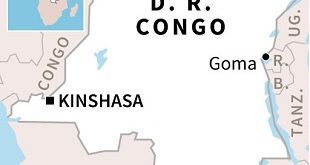
The new leader; Ramaphosa will need to urgently attend to them if the country is to chart a new course
COMMENT | FRED PHASWANA | Jacob Zuma resigned as South Africa’s president – an inevitable move, following the African National Congress’ withdrawal of its support. Two decades after Nelson Mandela tried – and failed – to pass the presidency to Cyril Ramaphosa, the former deputy president and current ANC head has become South Africa’s leader. And the challenges that Ramaphosa will face are almost as daunting as those Mandela confronted in lifting his country from the ruins of apartheid.
Nearly a quarter-century ago, four years after Mandela was released from prison, South Africans celebrated the birth of an inclusive, constitutional state. During Zuma’s tenure, however, that euphoria evaporated. Amid allegations of endemic corruption, ratings downgrades, corporate malfeasance, and deepening malaise among state-owned enterprises (SOEs), South Africa’s regional and international standing weakened.
For many, Ramaphosa represents a return to national strength. He has vowed to restore credibility to the management of South Africa’s affairs, and to reinvigorate the values of democratic inclusion. His simple gestures, like starting meetings and rallies on time, are departures from Zuma’s more aloof approach.
But returning accountability and good governance to South Africa will require much more than punctuality. Three key areas will need urgent attention if the country’s incoming leader is to chart a new course.
The first challenge, restoring faith in the country’s rule of law, may be the hardest to meet. Zuma’s “capture” of businesses, the National Prosecuting Authority, and cabinet appointments. was so complete that untangling the webs of influence will take time. But restoring public confidence in these vital institutions must be made a top priority.
Second, Ramaphosa’s government, whenever it is seated, will need to move quickly to reform the state’s relationship with State Owned Enterprises (SOEs). Zuma treated these businesses as vehicles for personal gain, and their mismanagement undermined economic growth and development. An economy characterised by poverty, inequality, and unemployment will never recover if the drivers of wealth are not operating effectively.
For example, mining continues to be a significant contributor to the South African economy; if managed properly, the sector could be a powerful lever for supporting the growth of upstream manufacturing. South Africa has some of the world’s largest deposits of chrome and manganese, minerals that are essential for the manufacture of electric vehicles, wind turbines, and other components of the so-called Fourth Industrial Revolution.
Unfortunately, because Zuma’s government misused resource wealth by redistributing mineral rents to loyal clients, trust between the mining industry and the state is nonexistent. And the only way to restore it – and thereby increase exploration and production – will be to overhaul legislation and regulation to ensure stronger protection of industry interests.
Restoring trust and accountability to the business environment would attract investment, create jobs, fill state coffers, and improve redistribution, especially to those for whom employment prospects remain limited. This final point is key; in recent years, South Africa’s welfare programs have been threatened by poor governance and mismanagement, and can be reformed only if economic growth returns.
Finally, Ramaphosa will need to invest heavily in South Africa’s education system, a sector that Zuma largely neglected. A good place to begin would be with early childhood education, where spending often yields high long-term rewards. With the youth unemployment rate currently at a staggering 39%; putting more young people to work will require rethinking how future generations are trained.
South Africa is a small country, but with the right reform-minded leadership, it can reassume its regional role as an economic and political powerhouse. In fact, this may be the ideal time to make changes at the top; much of Africa is undergoing similar shifts, which could bring new opportunities for economic cooperation. In neighboring Zimbabwe, for example, the end of Robert Mugabe’s misrule could reignite growth linked not only to natural resources, but also to value-added products, services, and trade.
As South Africa navigates its own presidential transition, the country must redefine its role in an evolving geopolitical landscape. To do that, the country must reassert its role as an influential actor, while pursuing a more dynamic, effective, and integrated investment strategy. Strong diplomacy and commercial outreach will be essential, and South Africa’s leaders should embrace and develop membership in economic clubs, like the BRICS group of major emerging economies (which also includes Brazil, Russia, India, and China).
South Africans are ready for new leadership. But to achieve a future defined by full employment, social justice, strong governance, and international credibility – the era that Mandela represented – Ramaphosa will need to return to the path from which Zuma so egregiously strayed.
*****
Fred Phaswana is National Chairman of the South African Institute of International Affairs.
Copyright: Project Syndicate, 2018.
 The Independent Uganda: You get the Truth we Pay the Price
The Independent Uganda: You get the Truth we Pay the Price


